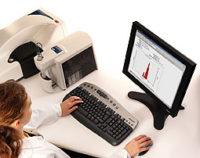Zeta Potential Analyzer Validated by Leibniz Institute for Polymer Research Dresden

Courtesy of the Leibniz Institute for Polymer Research.
The Leibniz Institute for Polymer Research in Dresden has successfully validated the measurement results of DataPhysics Instruments’ ZPA 20 zeta potential analyzer. The long-standing cooperation between the measuring instrument manufacturer and the institute has ensured that the measuring system meets the requirements.
Zeta potential measurements are important in a broad range of applications, such as the investigation of fuel cell membranes, fouling processes of filter membranes, bacterial growth on food packaging, and washing of textiles. The bidirectional, oscillating measurement method used by the ZPA 20 zeta potential analyzer is patented, and allows high-quality data sets in the shortest measurement times.
“When a solid surface is submerged in an aqueous solution, it becomes electrically charged due to dissociable surface groups and adsorption of ions and molecules,” said Astrid Drechsler, Ph.D., a scientist at the Leibniz Institute for Polymer Research Dresden e.V. (IPF), and an expert in the characterization of polymer interfaces. “The zeta potential provides information about these chemical functionalities and charge formation processes. Thus, it can be used to, for example, predict interactions such as adhesion between different surfaces.”
“The cooperation with the IPF helped us to tailor the ZPA 20 zeta potential analyzer to the needs of our customers right from the start, and to design it with the highest scientific standards in mind,” said Sebastian Schaubach, Ph.D., chief innovation officer at DataPhysics Instruments. “We are especially proud that the patented measurement method renders zeta potential measurements quicker, easier, and more reliable than ever before.”
For more information, visit: www.dataphysics-instruments.com.
Looking for a reprint of this article?
From high-res PDFs to custom plaques, order your copy today!








